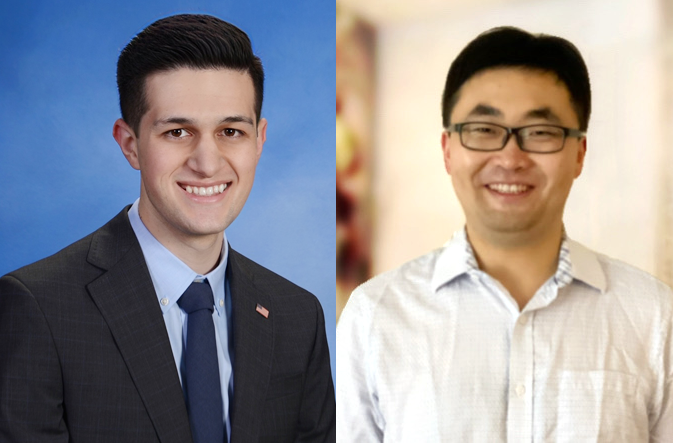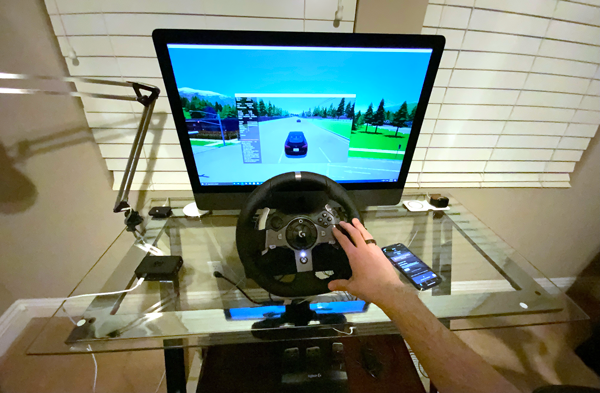EECS Students Shine in Association for Computing Machinery Student Research Competition

May 26, 2021 – Two UC Irvine electrical engineering and computer science students -- Armand Ahadi-Sarkani and Xiaowu Sun – won awards at the Association for Computing Machinery SIGBED Student Research Competition (SRC) held May 21, 2021. The competition was part of the Cyber-Physical Systems and Internet of Things Week sponsored by ACM and Microsoft.
Ahadi-Sarkani won the Gold Award for his project, "ADAS-RL: Adaptive Vector Scaling Reinforcement Learning for Human-in-the-Loop Lane Departure Warning.” Its goal is to improve existing advanced driver assistance systems (ADAS) by incorporating the human factor into the loop of computation to provide a personalized experience.
Ahadi-Sarkani graduated in winter quarter with a bachelor’s degree in computer engineering. He worked with Salma Elmalaki, electrical engineering and computer science assistant professor of teaching, on the research.
Specifically, Ahadi-Sarkani focused on the Lane Departure Warning (LDW) system. “We modeled the behavior of human driving (such as how quickly they respond to or ignore warnings, etc.) using a reinforcement learning-based model.”
He was able to continuously adapt and tune the warning interventions based on the changes in the human driving behavior as well as the human physiological state, such as attentive, drowsy and distracted. He used different sensor modalities and wearable devices to infer different human states.

“This award is very important to me, as it gives validation for the work I’ve been doing on this project over the last year with Professor Elmalaki, and hopefully will help me if I choose to pursue a career in research,” said Ahadi-Sarkani.
He added, “I feel like the school of engineering has been very helpful in guiding me through the initial stages of the research project, including finding the right faculty member that aligns with my interests. The faculty advisers at the student affairs office helped put me in touch with Professor Elmalaki.”
“Armand is a very bright student,” said Elmalaki. “I am very proud of him. He joined my research group as an undergraduate researcher and was so passionate. I gave him a very challenging research problem, and he was up to the challenge. He delivered the required tasks in a timely manner and was highly committed to the project. He implemented the whole computation stack with very high quality.”
She noted that Ahadi-Sarkani had to study new advanced materials beyond his course load as an undergraduate student. They published their findings in CPS-IoT Week, and Ahadi-Sarkani is the first author.
“This award and this paper from my student mean a lot to me as a faculty adviser because I always believe in encouraging undergraduate students to pursue research to expand their knowledge beyond their regular course load,” said Elmalaki.
Sun, a graduate student in electrical engineering, was a finalist in the competition with his project titled “Provably Safe Reinforcement Learning: An Abstraction-Base Approach.” Working under the faculty advisement of Yasser Shoukry, assistant professor of electrical engineering and computer science, Sun developed a novel framework to train neural network controllers that can provide probable safety guarantees to autonomous systems.
Sun’s research combines model-based design methodologies for dynamical systems with data-driven approaches to achieve the goal of safe and assured autonomy. Sun and his colleagues also implemented the framework to a real system – a small autonomous vehicle in the lab, which showed potential real-world applications.
“Doing research in Professor Shoukry’s lab is a great experience,” said Sun. “I am extremely grateful to him. He always encouraged me whenever I was facing difficulties. He is extremely knowledgeable and gives me a lot of useful suggestions on how to find interesting research topics.”
Sun noted the collaborative lab environment and colleagues added to his positive experience. “I like the academic environment and have great opportunities to talk with other researchers. Especially, the School of Engineering has many interdisciplinary research directions, and I can always find interesting seminars that provide new perspectives on my own research.”
– Tonya Becerra
